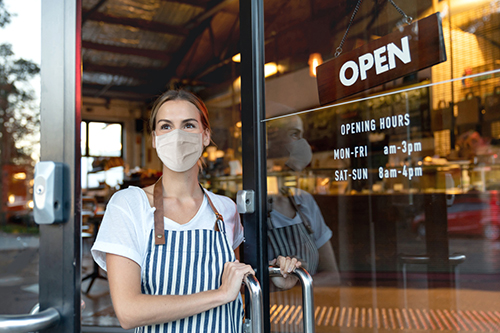
Restaurants and bars emerge as the big winners of Freedom Day
Britain’s managed pub, restaurant and bar groups lifted sales back close to pre-Covid-19 levels in July, new data has revealed, with restaurants and bars benefitting the most from the easing of restrictions.
According to the newest edition of the Coffer CGA Business Tracker, hospitality’s recovery from the pandemic was given a lift by the so-called Freedom Day on 19 July when venues were allowed to operate without social distancing measures.
The Tracker, produced by CGA in partnership with The Coffer Group and RSM, shows total sales were just 6% down on the same month in 2019. Restaurants had a particularly strong month, with sales only 2% below 2019, while drink-led pubs and pub restaurants were down 9% and 8% respectively. Bars benefited from the easing of restrictions on the late-night sector, as sales ended 3% short of 2019.
Karl Chessell, director for hospitality operators and food, EMEA at CGA, said: “While sales are still some way short of what we would expect at this time of year, July was another steady month of recovery for hospitality. Restaurants are enjoying the release of latent demand for meals out, and the return of nightclubs and late-night bars was a milestone in the journey back to normality for the drinking out sector.
“Trading conditions remain difficult though, and the 20% drop in rolling sales since July 2020 highlights Covid-19’s heavy toll on the sector and the need for continued support. On top of major operational challenges, it means that not all businesses are out of the woods yet.”
July’s solid performance comes despite a host of challenges for hospitality businesses, including widespread staffing shortages relating to recruitment issues and the ‘pingdemic’. Supply problems and ongoing caution among some consumers are also hitting businesses.
The Tracker also shows the lasting impacts of Covid-19 on hospitality, with rolling 12-month sales to the end of July 2021 down by 20% on the previous 12 months – a period which included the country’s first full national lockdown.
Looking once more back at July, managed venues benefited from generally good weather and the popularity of ‘staycations’ at the start of the school holidays. Domestic tourism contributed to a much better July for regions beyond London than the capital: sales outside the M25 were down by 2% year-on-year, but within the M25 they dropped 15% as visitor and worker numbers remained low.
Saxon Moseley, leisure and hospitality partner at RSM, said: “As Covid-19 case numbers stabilise, the number of fully-vaccinated adults rises and with a thriving staycation market keeping holidaymakers’ leisure spending in the UK, there is optimism moving into August of a return to trading levels not seen since 2019.”
Keywords:
- UK
- CGA
- Restaurants
- Bars
- sales
- hospitality
- sector
- year
- RSM
- month
- july
- EMEA
- covid
- covid 19
- july 2021
- Freedom day
- 12 month
- month sales
- managed venues benefited
- july managed venues
- first full national
- full national lockdown
- national lockdown looking






